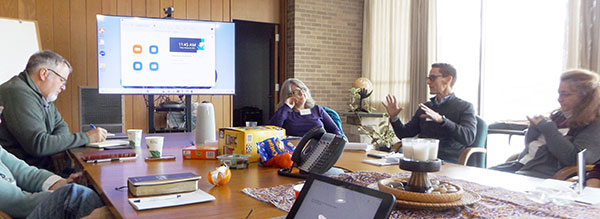By Walt Wiltschek
There’s no such thing as a part-time church. Congregations are called to be the body of Christ at any given time in a wide range of places. More and more Church of the Brethren congregations, however, do not have full-time pastors–around 75 percent of them, according to some recent surveys.
Facing that reality, how does the church support those who are called to serve while still carrying out the range of ministries needed? That’s a question that the denomination’s Part-Time Pastor, Full-Time Church program has wrestled with over the past few years, funded by a grant from the Lilly Endowment as part of its Thriving in Ministry Initiative. A team of “circuit riders” has provided resources and connections, with webinars, book studies, and spiritual direction among the offerings.

Please pray… For the Part-Time Pastor, Full-Time Church program, all who are involved in its leadership, and all the pastors who are participants.
With just under two years remaining for the grant, the Church of the Brethren Office of Ministry gathered a group of circuit riders, advisory team members, district executives, and others at the denominational offices in Elgin, Ill., Feb. 24-26, to take a “balcony view” of the program to date and consider possibilities and direction going forward. Led by Brethren leadership coach/consultant Greg Davidson Laszakovits of GDL Insight, the group used the Gospel of Luke’s eye-opening account of the Emmaus Road as a framework for reflection, storytelling, and discernment.
That model of accompaniment and dialogue in community feels apt given all the fluctuations and challenges being faced by the church in a shifting cultural environment, intensified in the wake of the recent pandemic. One participant highlighted the opportunities amid all that, saying, “This is an exciting time for the church to be able to make changes that are important.” Another noted the need for “healing and grieving” by congregations for that which has been lost, often requiring a re-thinking of identity.
Laszakovits introduced a Brazilian Portuguese phrase that translates to something like, “And then…,” encouraging contemplation of next steps that may flow naturally from where the church has been. That conversation eventually led to an “exciting flip” from the focus on the experience of being a part-time pastor to thinking more broadly about what it means to be a full-time church–a “community that is thriving and God-driven” and “all in” on its ministry. When congregation members embrace that call, it then makes the part-time ministry of a pastor more realistic and more energized.
One pastor at the retreat said they found being bivocational was a blessing, as it kept them with a foot in the world outside the church, which made it “almost a necessity to engage with people who don’t show up at a church,” a sort of “missional calling.” Several participants named the need to articulate a strong Brethren theology of the long-held belief in a “priesthood of all believers,” lifting up scripturally and philosophically why that is important to who we are as followers of Christ with a “new language” of how the church talks about ministry.
While the program has yielded some positive results, only about 5 percent of Brethren pastors have participated in the Part-Time Pastor, Full-Time Church program thus far. That makes broader buy-in important in the next few years–especially as the program seeks sustainability after the grant has ended. What would a successful result look like?
In the brainstorming and idea-sharing that followed, a number of potential short-term and longer-term priorities emerged, including enhancing marketing and awareness of the program, encouraging a culture of “Full-Time Church” in congregations, creating a directory of speakers and resources, facilitating deeper discussions between circuit riders and pastors, having more significant connections with districts, doing a sociological survey of part-time pastors to gather their stories and seek common themes, providing curriculum resources, and sponsoring a denomination-wide event to explore leadership and cultural shifts in ministry.
“We’ve done good work here,” Laszakovits said as the conversation wound down. Then, reflecting on everything at stake in the notes on newsprint spread around the room, he pondered aloud, “Does anything in the church have more importance than this right now?”
Find out more about Part-Time Pastor, Full-Time Church at www.brethren.org/ministryoffice/part-time-pastor.
— Walt Wiltschek is district executive minister for Illinois and Wisconsin District, serves on the editorial team for Messenger magazine, and also now holds a new part-time position as office coordinator for Brethren Volunteer Service.
‑‑‑‑‑‑‑‑‑‑
Find more Church of the Brethren news:
- Annual Conference 2024 invites Church of the Brethren to gather in Grand Rapids
- Annual Conference officers return query regarding congregational latitude on matters of human sexuality
- Silent Auction to benefit translation expenses and the general Annual Conference budget
- Mission and Ministry Board completes Kingian Nonviolence training, works at envisioning
- Leadership Team issues clarification on On Earth Peace membership with Supportive Communities Network